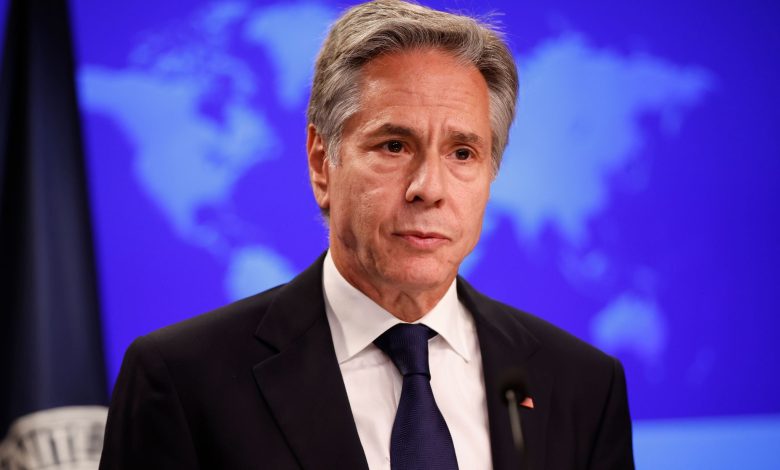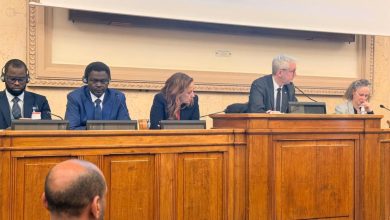Reports
U.S. State Department Places Sudan as a Priority in Geopolitical Competition

Sudan Events – Agencies
The United States has made it clear that Sudan is a key focus in its foreign policy regarding geopolitical competition with Russia and China in Africa and the Middle East, as well as in its efforts to solidify what it considers foundational pillars for its welfare and existence. This has led to a reactivation of its policies and alliances within these regions.
On October 30, U.S. Secretary of State Antony Blinken addressed internal stakeholders at the U.S. State Department’s Foreign Affairs Institute, discussing policies aimed at enhancing his country’s international standing and countering its rivals. He noted that as geopolitical competition continues to shape a new era in international affairs, old challenges such as conflicts, terrorism, and the absence of political stability persist, threatening U.S. interests in resources and benefits in regions where it seeks to strengthen its presence and influence.
Although the Secretary was discussing U.S. policy broadly, he cited Sudan as an example of areas where the U.S. faces competition from other powers. This suggests that the U.S. will spare no effort in employing various tools and strategies to bolster its position and prevent other parties from gaining the upper hand in Sudan.
This might even include what American academics and politicians refer to as a proxy war, similar to what is happening in Sudan today. The three elements of conflict, lack of political stability, and a breeding ground for terrorism are present in Sudan. Terrorism could emerge from groups like Boko Haram in the west or ISIS in the east if Sudan were to fragment or descend into chaos. Alternatively, if the U.S. allows allied countries in the region to use the “scarecrow” of Islamists to deny a broad spectrum of Sudanese citizens the chance to compete and breathe freely, it would fulfill the fears and ambitions of those countries that fear what they term political Islam. They seek an Islam limited to rituals confined within the walls of mosques, not an Islam that guides transactions among people and governs their lives, as Islam predominantly deals with transactions.
To address these challenges, Blinken stated that the U.S. aims to enhance its alliances and forge new partnerships—”new allies to deter and defeat aggression.”
In his speech to senior officials at the State Department’s Foreign Affairs Institute last Wednesday, he referred to various global challenges, mentioning, “We see this across the world, from the Middle East to Sudan to Venezuela. Thus, the world we face has become more competitive, more complex, and more volatile…”
Notably, neither the Secretary nor the Institute director mentioned any Arab or African country other than Sudan in this significant address regarding U.S. foreign policy and support strategies. Russia was only mentioned four times, Europe four times, and Asia was referenced only through China, Iran, and North Korea. Whether this focus on Sudan is negative or positive, it certainly reflects Sudan’s importance in U.S. foreign policy and its perceptions of potential economic and security-strategic resources. This indicates that addressing what he termed challenges facing the U.S.—from a position of strength, as he stated—required the State Department to undertake “historic investments here at home in our competitiveness, and we are working to re-engage, renew, and reimagine our alliances and partnerships around the world.”
To justify his country’s pursuit of superiority, Blinken remarked that everywhere he and his colleagues go, they hear the same thing: “The United States is the partner of choice. Not only from our federal government but also from local governments, the private sector, universities, tech experts, and charitable organizations… People continue to look to the United States.”
Implementing U.S. Policy in Cooperation with Allies
Blinken elaborated on his country’s approach, stating, “It is also in our deep interest to collaborate with our counterparts abroad because we can accomplish much more together than any of us can do alone. We know that the strength and success of our friends directly benefit our security and prosperity—more markets for our products, more partners to tackle global challenges, and new allies to deter and defeat aggression. This is at the core of what has driven our approach to the world—enlightened self-interest—and I believe it should be at the heart of how we engage with the world now.”
He added that in order to respond to global developments, U.S. diplomacy, especially the State Department, must be “fit for purpose, organized, resourced, and equipped with the talent necessary to lead in addressing the most pressing issues of our time.”
He then turned to explain the foundational elements that must be internally solidified before building for the future: “We had to reinvest in some of the fundamentals of our diplomatic profession: regional expertise of our personnel, proficiency in foreign languages, negotiation skills, and understanding of international politics and history.” He emphasized the necessity of addressing core administrative issues, such as ensuring the safety and protection of embassies and consulates, safeguarding data and communications, and caring for the health and well-being of personnel.
No Need to Reinvent the Wheel
In the context of building on accumulated experiences, the Secretary stated, “At the same time, in developing this modernization agenda… we wanted to build on previous efforts and initiatives, not reinvent the wheel. Look at the amazing work done by some of my predecessors, both Democrats and Republicans, to enhance the Department.” He added, “We have drawn on the insights, voices, experiences, and expertise of many people across the Department and our allies and partners in Capitol Hill and many others.”
Blinken pointed out a fundamental pillar for America and the West generally: continuity. They do not possess what we have, such as “sweeping away the remnants of May,” or dismantling the regime… He confirmed that they recognize they cannot complete this work overnight or even within a single term or administration. If this agenda is to endure, “it must be rooted in our national interests and in initiatives expected to be championed by any Secretary of State, regardless of their party, on behalf of the American people.”
He asserted that none of these modernization efforts could have been achieved without strong bipartisan support in Congress, which requires exceptional efforts and people in every position, in every office within this department: civil service members, foreign service officers, qualified family members, contractors, and local staff.
Talent Acquisition Policy
Blinken addressed his department’s personnel by saying: “Let me talk a little about what we have accomplished so far and, again, what remains to be done. First, we have reorganized the department and invested in our capacity to lead on the issues where our diplomacy is increasingly active. “We have created an office for cybersecurity and digital policy, as well as an office for the Special Envoy for Critical and Emerging Technologies. We have brought in incredible talent in these areas to ensure that the United States and our people can achieve their future goals, maintaining our collective advantage in the technologies that shape our future.
Throughout our diplomacy, we have prioritized leadership in standards and metrics, enhancing digital freedom, safeguarding our most sensitive technologies, and strengthening vital supply chains. We are committed to building what we call digital solidarity—because we have a deep interest in working with partners who share our vision for a vibrant, open, and secure technological future.”
Health Diplomacy
Blinken then discussed some of the ministry’s initiatives that enhance its agenda but fall outside the core of diplomatic work. He stated that in the wake of COVID, President Biden made it clear that they need to prioritize health diplomacy, leveraging decades of experience from the State Department and the U.S. Agency for International Development with SARS, Ebola, and HIV/AIDS. Thus, the “Global Health Security and Diplomacy Office” was established to serve as a central point for all public health efforts, working with partners abroad to strengthen health systems, combat deadly diseases, and prevent future pandemics.
The China Challenge
He then addressed the challenges posed by the People’s Republic of China, stating that they “affect every aspect of our foreign policy and every region of the world. We have built what we call the ‘China House’—an office that brings together experts from across the department and other agencies under one roof, where they can better coordinate and manage this most complex and important relationship.”
“We have invested in our economic governance—placing greater emphasis on improving development financing, enhancing supply chains, elevating the sanctions coordination office, appointing a Global Anti-Corruption Coordinator, naming a Special Representative for International Labor Affairs, and establishing a task force to help countries become more resilient in the face of economic coercion.”
After addressing China, he moved on to Russia and the coalition he views as opposing U.S. interests, stating, “Today we face a limited number of retrograde powers—especially Russia, in partnership with Iran and North Korea, as well as China—that are aggressively challenging our interests and values and are determined to change the fundamental principles at the heart of the international system. Only China has gained the economic, diplomatic, technological, and military power necessary to do so at both regional and global levels.”
Where Lies America’s Interest?
In this context and within this framework of American determinants, should we consider what is happening in our country? It has become evident that it is all about interests and resources, and there are no permanent friends, only permanent and renewable interests. As political experts say, it is unwise to engage in a war if someone else is doing so on your behalf. Undoubtedly, if the United States wished to curb those fueling the war through funding and supplies, it could do so, but it looks beyond that: what benefits its companies and economy, and what does it lose if it considers someone its adversary? Does this mean Sudan should make strong promises to uphold the interests of those behind the scenes in the current war to ensure its escape from it? With its resources and geographical position, Sudan has much to offer the U.S., perhaps more than it desires. Does Blinken’s vision for Sudan’s stability, security, and peace align with American aspirations, or does instability and fragmentation serve U.S. interests better?
I believe that such details remain a subject of discussion within the U.S. State Department, but they are not typically addressed in the kind of open discourse available to those seeking insights into these matters.
Source: Al-Muhqiq News Site



